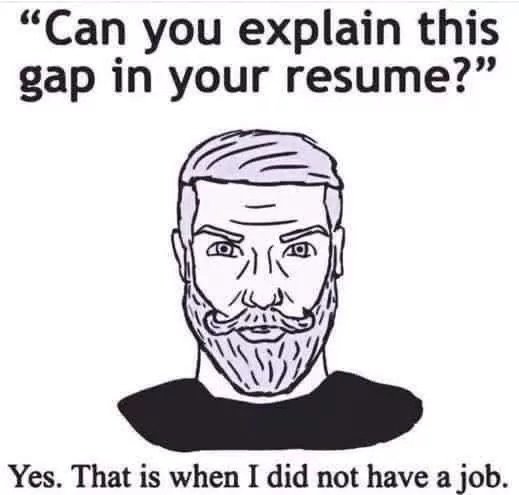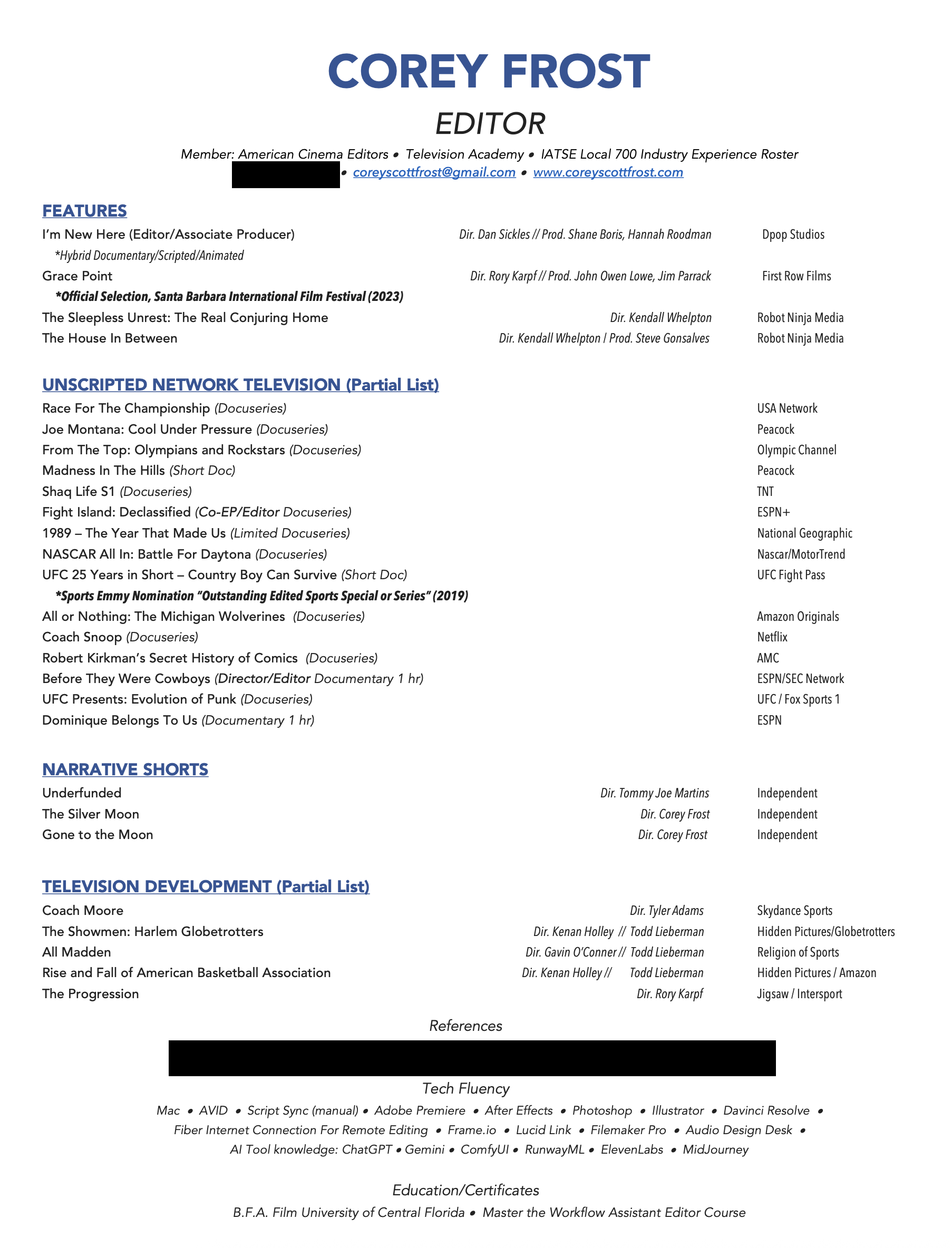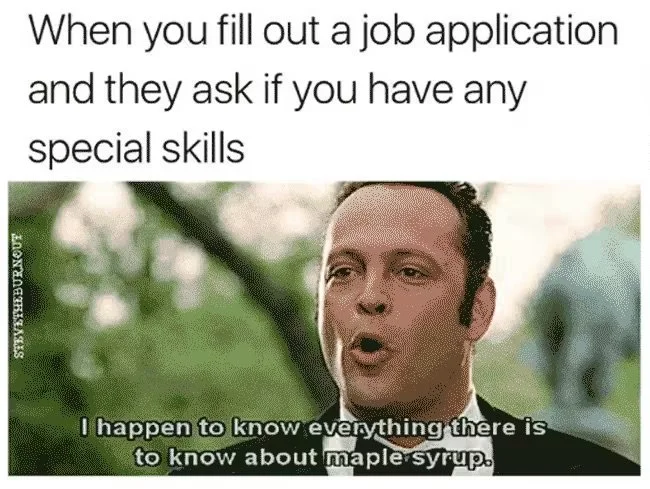Editing Your Resume for Film and TV
Let’s be real. Making resumes and cover letters are a drag and don’t get me started on having to manual input my resume into an online job application form after spending hours on creating it in word or photoshop…but I digress. No one enjoys tweaking margins or rewriting the same bullet points for the tenth time. But here is the catch. The people reading them also find sorting through them just as tedious. They are flipping through stack after stack of the same cluttered wordy pages. That is where you have a chance to stand out. A clean resume with relevant credits, sharp structure, and just enough personality can feel like a breath of fresh air. The goal is not to tell your whole life story. It is to make them stop, notice, and want to know more. The resume is YOUR story in a snap shop.
Now, what about a cover letter?
Cover letters are simple. Think of them as a mechanism, not a storybook. No one wants to read a long essay about your passion for editing or how you fell in love with film as a kid. Keep it short, one to three paragraphs at most. State who you are, the role you want, and why you fit. Mention one or two things that connect you to the company or project and then stop. Make them strong, short, and sweet.
Do not rehash your resume, that is what the resume is for. A cover letter should feel like an introduction, not your autobiography. The resume carries the details. The cover letter is just a brief signal that you are worth a closer look. This goes without saying as well to read the instructions of the job application for cover letters. Some companies or postings may have instructions so they can see how you follow the directions. These are strategies that help recruiters cut down applicants. So read and follow directions.
Resume / CV Structure
My go-to Resume layout:
Your name and target role (Make it stand out)
Contact info (with a clean email and portfolio link if applicable)
Don’t put your exact address you live put the city you are trying to work in/applying for
Experience
Skills
Education
Hobbies
References
Awards/Achievements (If any)
Don’t lead with education UNLESS you don’t have working experience. Experience always top and yes even your fancy NYU or USC film school degree comes second. Then skills and education comes after your experience. Hobbies (debatable if you need this) and references go at the bottom in my preferred layout but take it with a grain of salt here. You may find it more useful else where depending on your design. I’ve seen many resume designs where skills and education is left or right margins.
One note: IF you have the work to justify two pages, I think it’s okay BUT do NOT just fluff it. If you don’t have it, keep it to a single page.
Let’s explore some of this deeper along with some r/editors advice:
Experience
Put relevant credits up front if you have them. Student/Educational films count, don’t discount them.
If you are applying as an assistant editor show recruiters/job posters how you’ve handled syncing dailies, post workflows, or show you're headed that way with your past experience. If you have non entertainment working experience, list jobs that may show skillsets that apply like attention to detail, following direction within a hierarchy, or if you can make coffee and take orders efficiently from your work at Starbucks (applies for post PA type gigs). Recruiters are looking for things you may not even realize they are looking for. Think ahead and read the posting.
Real-World REDDIT Advice
“I would get rid of all your complete sentences and change them to bullet points… The more concisely I could explain something, the better… stick your education section at the bottom.”
— dajackinator – emphasizes clarity, brevity, and real priorities. Reddit
This is good advice above. Bullet points if you want to list any and don’t repeat words like “helped” or “worked.” 3-6 relevant points from the job without periods. Don’t fluff it though.
If you list 4 jobs you worked as an assistant editor for example, don’t just list all the assistant editing responsibilities within your bullets. Those hiring assume you know how to do the job of an assistant so listing basic functions of an assistant is a waste of space on your resume. Think about what else made you stand out or unique responsibilities you had. Don’t worry about adjectives either that’s just fluffing it up and becoming wordy. Get to the point and keep your bullets tight.
“Resumes really should look more like a credit list. Show, network, season, position, dates. Maybe a small section with software and skills, that’s really it.”
— r/editors community – simplicity wins in creative roles. Reddit
“I generally try to keep it to one page by omitting irrelevant credits… My resume goes like this… CREDIT LIST… broken into subgroups… Each credit will show name, show genre, seasons, years, production company/studio/network…”
— the_mighty_hetfield – a clean, organized, credit-first format. Reddit
Also:
“If you have enough credits… AE work is pretty redundant… Your resume looks pretty similar to an IMDB page… the fact that you’ve been steadily employed for three years means more than any skill you can claim on paper.”
— OfCourseImRightImBob – consistency matters more than repetitive detail. Reddit
“It’s super helpful to put a list of software you're 100% comfortable with at the bottom of your resume.”
— dbez – separates hard skills cleanly. Reddit
“I have my skills on the left of the page and experience on the right… when I’m in a rush, I like reading what softwares they're familiar with first and then scanning experience after.”
— mildly_interesting – smart layout choice for fast scanning. Reddit
“Lots of good advice here, but it 100% depends on the job… if you’re applying for a job where they are used to interviewing editors, the more standard 'list of credits' type resume is perfect. But if you're applying for a job more in the corporate/agency world… a more standard resume format is best.”
— TikiThunder – adapt to the audience. Reddit+1
Let me also say one thing about templates. If you find a free template online just know everyone else has access to that same template. If 50 people apply to a job, and 49 people have the same template and one doesn’t (assuming they have the experience necessary) who do you think stands out the most? This is how you should be thinking.
Nina Staum added some suggestions as well after reading this post I wanted to share as well:
References Matter
Include a references section with names and contact info. Get their permission first though. Avoid using “References available upon request”. It puts more work on the hiring party and usually doesn’t help you. It won’t be a deal breaker all the time, but if someone wants to quickly email a reference this causes a bump in the road. Listing references speeds things up and shows you're transparent and proudly listing people who will vouch for you. Find a diverse range of people too and absolutely NO family. If you have 3-5 references that’s great. Don’t list just one reference because if they don’t respond it may hurt your application status.
Emails
Use a clean, professional email. Your name or initials. Avoid anything unprofessional like hotguyz69@gmail.com. Don’t get your resume thrown in the trash with an unprofessional email address. It’s common sense, but you’d be surprised how many can overlook this. Avoid emails with a .edu address. It’s a small detail with big credibility impact. It may show your lack of real world experience.
Fonts & Formatting
This is my current resume. I’ve gone back and forth on design, but I keep finding my way back to this type of layout. I haven’t updated it fully in a while, but it can give you a sense of one person’s design style. I blacked out any personal contact information if you are wondering about my redactions and you didn’t assume already. My font used is Avenir if you are also curious.
Keep it clean is my biggest piece of advice here. This is all debatable. Calibri or Helvetica are nice safe bets. Use crazy fonts sparingly if at all. Make sure your name and job title are BOLD and UNAVOIDABLE. Why? Someone who is hiring may have multiple resumes for several different available jobs all in a single stack. If you are applying for the assistant editing job make sure it’s very visible so they know when flipping through where to put yours.
Avoid over-design because clarity always wins. That doesn’t mean you can’t make it look cool or inviting. It does mean you should make sure your design doesn’t get in the way of your story. Similar to stylizing a TV/Film edit. Style means nothing if they story is muddy. Story MUST come first!
That means white space is your friend. Find that balance.
My current personal resume needs a refresher. It is more like a clean credit list. I’ve gone back and forth on my design, but I usually always fall back to the list version vs a stylized design. In fact, I sent a stylized photoshop version of my resume to some colleagues and they all seemed to hesitate on whether it works or not. That’s not a good thing. So remember that a clean, clear, and concise resume will always be your friend.
Grammar Check
We all slip up. In fact, many years of working in live broadcast I’m guilty of sending many spelling errors to the control room in my edits. We’re all human so have a few different people proofread your resume. Especially after you've stared at the same page for hours. Catch the typos before recruiters do. In assistant editing, your job is attention to detail. If you show you can’t do that even before an interview, how can you prove you won’t overlook a turnover detail or paperwork? It’s so important!
Hobbies
Ok, this can be debated endlessly I’m sure in recruiting. Are hobbies a crucial section on a resume? Meh, probably not. But more and more I hear people (especially in post production) say that listing hobbies is a good thing. Why? The nature of our industry pits people in dark rooms together for very long hours. If you list a hobby that an editor, producer, and/or director can relate to you may have a leg up. Maybe it’s a talking point in an interview. Maybe it’s a way to connect with someone on a deeper level and lands you a second interview. It certainly can’t hurt, but keep in mind it’s a balance and potentially listing them could actually do the opposite if you are a believer that it could help in the first place.
Some homework to check out too:
Also, every single talent agency that reps editors has their resumes online. Now, these aren’t always a masterclass in resume design or even necessarily inviting, BUT it shows you what agencies send out to filmmakers when they are hiring. I think the biggest thing to take away is the clean and clear designs. The agencies are more of a credits list vs anything else. But you can always build your personal resume with a similar layout while still keeping sections and bullets you want to. Dive into a couple larger agencies that rep editors below:
Final Word
Resumes/Cover letters will never be exciting to make, but they are a tool you cannot ignore. If you strip away the noise, keep clean, and present yourself clearly, you are already ahead of half the stack. Trust me, I’ve seen a lot over the past two years. The goal is not to fluff up your experience, it is clarity. Show that you can do the work, make it easy to read, and leave them wanting more. That is how you stand out.
If you read this and have advice to share on building a great resume in film/tv drop me a line so we can add it to this blog post. My goal is to openly share as much knowledge with this blog to help as many people as I can land their dream job and feel ready to take the bull by the horns WITHOUT a paywall!


